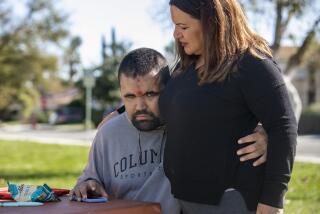A long sentence for ‘heinous’ child abuse
The emergency call came in as a domestic violence assault: A man had stabbed his girlfriend in the parking lot of a Las Vegas hospital.
But as detectives began to investigate, they unearthed a dark family secret. The suspect was not the victim’s boyfriend but her father, who had been sexually assaulting her for nearly two decades and had fathered her three children.
The assaults, the victim told authorities, started when she was 6 years old and living in Los Angeles. She said her father, a martial arts instructor, threatened to kill her if she told anyone and kept her a prisoner at home, monitoring her movements using surveillance cameras and delivering fierce beatings during paranoid rages.
On Friday, the daughter, now 29, sat silently in a downtown Los Angeles courtroom as a judge sentenced Lindolfo Thibes to prison for 109 years to life in what police describe as the most heinous case of child abuse they had encountered.
As her father was led away in handcuffs, the woman wept quietly and embraced her younger brother, who she said was also a victim of beatings by their father.
“I hope he suffers,” said the woman, whom The Times is not identifying because she is a sexual abuse victim. “I want him to die in there in jail because that’s what he did to me. He confined me.”
Thibes said nothing about his guilt or innocence at Friday’s hearing but offered a litany of rambling complaints to the judge, all the while referring to himself in the third person.
Acting as his own attorney, Thibes, 48, said his case should have been dismissed long ago on procedural grounds. He said he has been hallucinating and “believes that shadows are out to get him.” He called his trial a “kangaroo court” and said his conviction was the result of fraudulent evidence and perjured testimony.
But a prosecutor said DNA tests confirmed the daughter’s account, proving that Thibes was both the father and grandfather of her three children. All girls, they are 4, 7 and 11.
Jurors were told about the genetic evidence and listened to harrowing testimony during four days of trial earlier this year. It took them about three hours to convict Thibes of multiple counts of rape and other sexual assaults committed over a decade.
“He’s probably the sickest suspect I ever had,” said Torrance Police Det. Rick Carr, a 28-year veteran who was the lead investigator on the case. “This poor woman endured just some unbelievable torture and horrendous acts.”
Born in Brazil, Thibes came to the United States illegally in 1982, according to a probation report. His daughter, younger son and common-law wife soon followed, and the family settled in Los Angeles.
The victim told investigators that the abuse began in the mid-1980s when she and her father were alone in the house. Her mother worked nights and eventually moved out of the home to be a home healthcare provider. (The mother could not be reached for comment.)
Her father, the woman told authorities, plied her with alcohol and marijuana from the age of 8. She said she was pulled out of school in sixth grade and estimated that she was sexually assaulted about 10 times a week, according to law enforcement records.
In an interview with The Times, the woman said her father rigged the family’s West Adams home with surveillance cameras inside and out. Under her bed, she said, were motion detectors that set off an alarm when she got up.
As a teenager, she was forbidden to leave the house alone. Her father often grew paranoid and accused her of trying to escape or of secretly meeting boys. Enraged, he would beat her and her brother on their feet with a baseball bat, she said.
She feared deportation if she reported the abuse, she said, but was also terrified of the consequences if authorities did not believe her.
He said he “would kill me if he ever got his hands on me if I ever told,” she said. “He used to tell me he was going to cut my head off.”
At 17, she gave birth to her first child. For years, she said, her oldest daughter was her only friend. The moments they shared playing with the girl’s toys or watching television offered small but important comforts during her life with her father. There were also times, she said, when she and her father played video games or watched movies together.
“I would use little happy thoughts to keep me going,” she said.
Her father, she said, grew fearful that her brother had told police about abuse at the home and fled to Las Vegas in 2003, taking her and her children. They lived in a motel, where, she said, Thibes told others that she was his girlfriend.
In April 2005, he stabbed her twice in the chest with a 10-inch kitchen knife, police records show. In interviews with police, he described her at various times as his wife, girlfriend or daughter.
The woman said she told hospital workers about the abuse once her father had been arrested and she knew her children were safe in custody.
“I thought, ‘I’m not going back to Dad,’ ” she said. She moved to Torrance, where police began investigating the case after learning what she had told Las Vegas authorities.
Thibes, who pleaded guilty to the stabbing, told a probation officer this week that he did not know how his daughter could “make such accusations after the good upbringing he provided her,” according to the officer’s report. Thibes also blamed his conviction on mental illness, saying he had been diagnosed as a paranoid schizophrenic.
But on Friday, Superior Court Judge Dennis J. Landin rejected Thibes’ claim of mental illness, saying he believed it was a fabrication designed to delay sentencing.
Deputy Dist. Atty. Rouman Ebrahim reminded the judge of the woman’s testimony during the trial, saying Thibes had been charged with only a fraction of the assaults she recounted and deserved the maximum sentence. “The conduct in this case is so shockingly heinous,” Ebrahim said. “It was done by someone that society expects to be a protector, not a predator.”
The woman lives in the Antelope Valley with her girls and said she is allowed to remain in the U.S. thanks to a special visa for crime victims who cooperate with law enforcement.
She said she dreams of writing a book or perhaps becoming a therapist to help similar victims. She is struggling to find a job but said she is determined to provide for her children. “I want them to be loved,” she said. “I’m living the childhood I didn’t have through them. . . . I want to make sure they go to proms and have all the stuff I didn’t have.”
More to Read
Sign up for Essential California
The most important California stories and recommendations in your inbox every morning.
You may occasionally receive promotional content from the Los Angeles Times.











